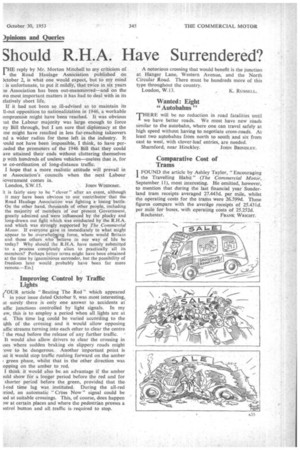Should R.H.A. Have Surrendered?
Page 53

If you've noticed an error in this article please click here to report it so we can fix it.
FHE reply by Mr. Morton Mitchell to my criticism of the Road Haulage Association publishd on ktober 2, is what one would expect, but to my mind is unfortunate, to put it mildly,. that twice in six years le Association has been out-manceuvred—and on the wo most important matters it has had to deal with in its elatively short life.
If it had not been so ill-advised as to maintain its 11-out opposition to nationalization in 146,a workable oinpromise might have been reached.. It Was obvious lat the Labour majority was large enough to force fly. Bill through, but I am sure that diplomacy at the me might have resulted in less far-reaching takeovers nd a wider radius for those left in the industry. It /ould not have been impossible, I think, to have perJaded the promoters of the 1946 Bill that they could ave attained their ends without cluttering themselves p with hundreds of useless vehicles—useless that is, for le co-ordination of long-distance traffic.
I hope that a more realistic attitude will prevail in le Association's councils when the next Labour.
iovernment comes in. • London, SVi7.15. ' JOHN WISDOME.
Et is fairly .easy to be " clever " after an event, although it may have been obvious. to our contributor that the Road Haulage Association was fighting a losing battle. On the other band, thousands of other people, including the majority of members of our present Government, greatly admired and were influenced by the plucky and long-drawn out fight which was conducted by the R.H.A. and which was stiongly supported by The Comniercial Mawr. If everyone ga.ve in immediately to what might appear to be overwheltating force, where would Britain and those others who ''believe in our way of life• be today? Why should the R.H.A. have tamely Submitted to a process, completely alien to practically all its members? Perhaps better terms might have been obtained at the time by ignominious surrender, but the possibility of freedom later would probably have been far more remote.---Eo.]
Improving Control by Traffic Lights
(OUR article "Beating The Red " which appeared L in your issue dated October 9, was most interesting,. at surely there is only one answer to accidents at attic junctions controlled by light signals. In my ew, this is to employ a period when all lights are at d. This time lag could be varied according to the idth of the crossing and it would allow opposing attic streams turning into each other to clear the centre the road before the release of any further traffic.
It would also allow drivers to clear the crossing in tses where sudden braking On slippery roads might .ove to be dangerous. Another important point is tat it would stop traffic rushing forward on the amber I green phase, whilst that in the other direction was opping on the amber to red.
1 think, it would also be. an advantage if the amber )uld show for a longer period before the red and for shorter period before the green, provided that the 1-red time lag was instituted. During the all-red niod, an automatic "Cross Now" signal could be ;ed at suitable crossings. This, of course, does happen )v at certain places and where the pedestrian presses a mtrol button and all traffic is required to stop. A notorious crossing that would benefit is the junction at Hanger Lane, Western Avenue, and the North Circular Road. There must be hundreds more of this type throughout the country.
London, W.13. K. RUSSELL, Wanted: Eight "Autobahns" THERE will be no reduction in road fatalities until we have better roads. We must have new roads similar to the autobahn, where one can travel safely at high speed without having to negotiate cross-roads. At least two autobahns from north to south and six from east to west, with clover-leaf entries, are needed.
Sharnford, near Hinckley. JOHN BR1NDLEY.
Comparative Cost of Trams • .
I FOUND the article by Ashley Taylor, "Encouraging the Travelling Habit" (The Commercial Motor, September 11), most interesting. He omitted, however, to mention that during the last financial year Sunderland tram receipts. averaged 27.443d. per mile, whilst the operating costs for the trams were 26.599d. These figures compare with the average receipts of 25.431d. per mile forbuses, with -operating costs of 25.252d.
Rochester. FRANK WRIGHT.




















































































